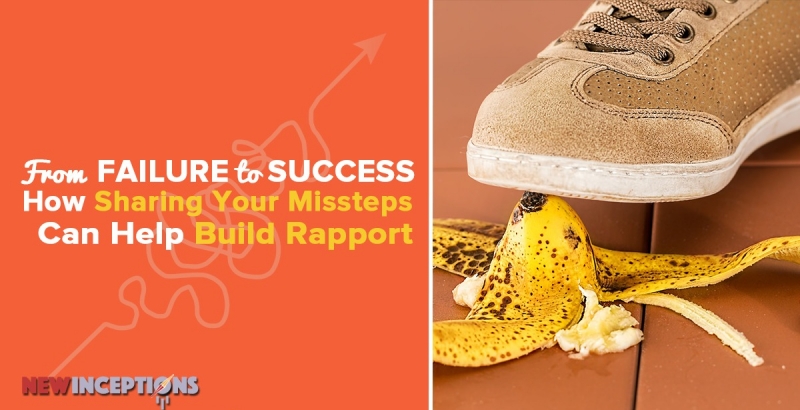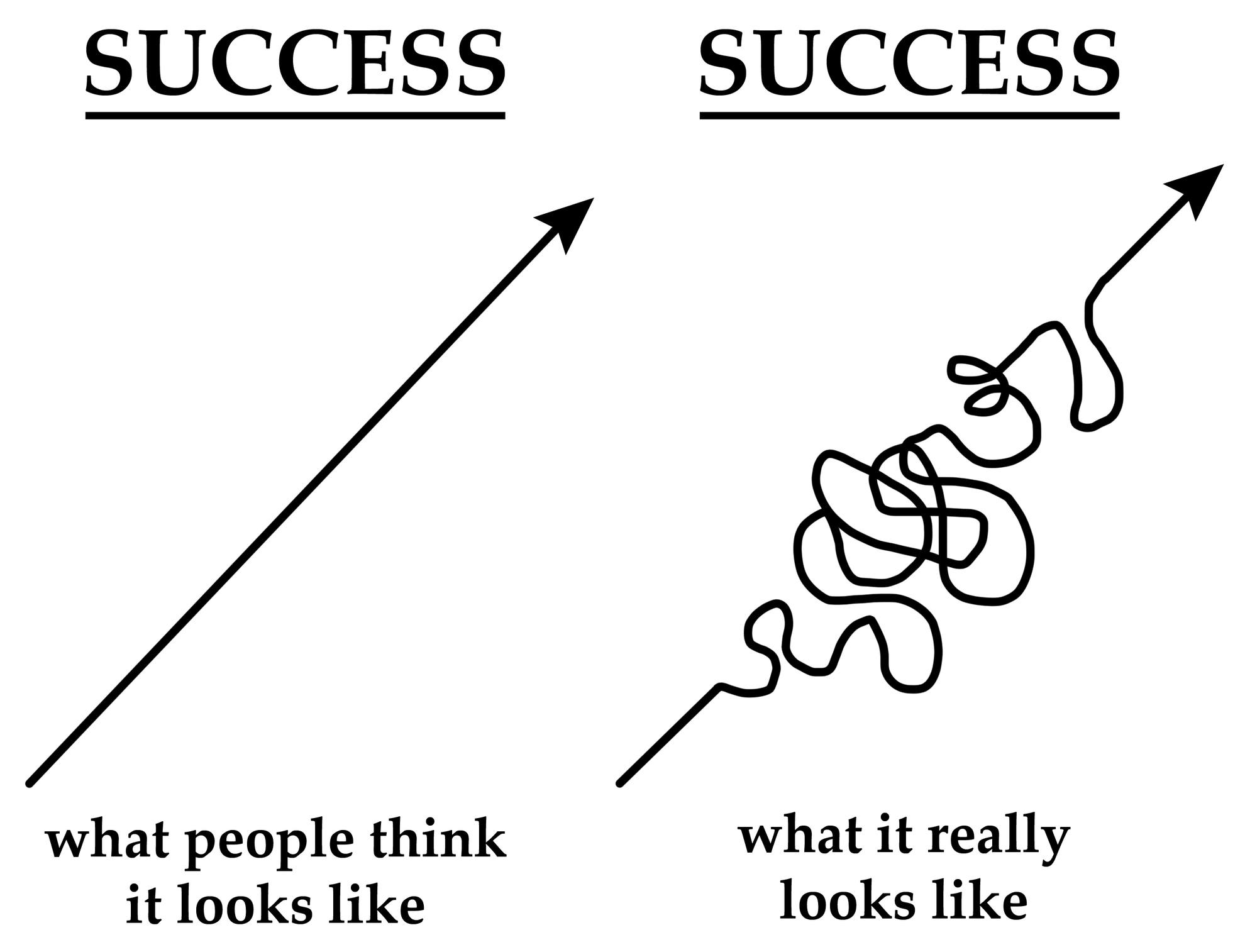From Failure to Success: How Sharing Your Missteps Can Help Build Rapport
During the beginning of my entrepreneurial career, I heard a lot of failure to success stories. Whether they were in an LTD speech or on a podcast, these talks always had a way to motivate me to want more. However, when sharing these stories with others, I would have trouble conveying the messages in a way that motivated them as they motivated me.
Later, I heard John Maxwell talk about what might be the reason for this. And as I dug into it more, I realized that what he said made a lot of sense.
He said that many times, when we’re trying to encourage people with these awesome stories, we’re actually discouraging them.
Why?
Because they’re simply hearing too much about success. They’re comparing their own lives to these amazing people and “emotionally disqualifying” themselves.
But here’s the thing. All real success in life has a huge component of failure. When I was in academia I didn’t understand this. I couldn’t afford to fail my classes. So I did things I look back at now and realize it wasn’t part of my character.
Likewise, when people are in the corporate world, they’re afraid to lose their jobs. So they’ll avoid confrontation with their higher ups. The problem is that being a “yes man” might actually hurt the company in the long run.
Building Hope in Others
When we’re telling our stories to attract others to what we’re doing, we naturally might feel that it’s necessary to illustrate ourselves in a way that we’d perceive an “expert” would.
The problem I’ve seen several entrepreneurs make in their media, posts, or other messages, is that they rarely embrace the hard times. In fact, you might know some folks where all they ever show is their awesome toys – the results of their success.
Those of us who have seen success though, know what it took to get to where we’re at. In fact, I always think of a certain illustration when asked about “what success looks like”:
When we embrace our failures, it makes us seem more reachable and it makes those who we’re influencing more teachable.
Or, in short,
People are impressed with success but impacted by our failures. – John Maxwell
Investing in and Learning from Failures
When I was going to high school, I remember someone (probably a guidance counselor) asking me a random question. I’m sure you’ve been asked this question too:
What would you attempt to do if you knew you wouldn’t fail?
I remember answering this question would motivate me to think about the future and what I wanted to do.
But there’s a problem inherently wrong with this question. In the long run, it’s not possible to be successful without having that element of failure.
So a better way of asking this question might be something like:
What would you attempt to do if you knew you WOULD fail, but you knew you would learn, grown, and get better?
Adjusting on the Fly
One of the most successful coaches in NFL history has been Bill Belichick. Love or hate the Patriots, you have to admire how they’ve been able to win as much as they have in the last two decades.
Many people attribute their success to Bill’s ability to make appropriate adjustments at halftime.
In contrast, as I’ve previously mentioned in this post, the 2017 Colts were notorious about losing games in the second half. While many times they seemed to come out with a lot of energy, inevitably halftime would come.
While most teams would change things a bit, they didn’t seem to change their game. In fact, if they were leading at half time, they’d play far more conservatively.
They were playing not to lose.
The difference between these two coaching approaches is jarring. The Colts coaching staff knew they were playing for their jobs. And subsequently, they feared failure.
On the other hand, the Patriots are willing to change things up during the game. Sure, they don’t want to lose, but they’re in a much better place to succeed with all the adjustments they make. Plus, if they do lose, they put even more time in the film room to figure out how to improve.
Seeing Failures as Learning Experiences
So how do we go from “playing not to lose” to “playing to win”? Again, it’s all about seeing failure as a means to success.
That said, there’s a handful of small tweaks we can make in our perspectives if we really want to make a change:
Get More Optimistic
There’s always ways to get better. Whether it’s through honing your own skills or helping others get better at their strengths, there’s always a chance to improve.
Take More Responsibility
When I think of the poise that Peyton Manning had and now Andrew Luck as leaders of the Colts, I can’t help but notice how much responsibility they’ve taken. Instead of blaming others for their loses at the post game podium, they’d always respond with “That’s my fault. I could have played better.” or “There’s things we all need to work on. I didn’t help the situation today.”
Even in a win, their response was/is always predictable “Yeah, we’ve come pretty far and did really well today. But there’s some things that we can definitely clean up a bit more.”
Though they might not have been the sole reason for a loss, they took responsibility of the failure. And it’s through this simple perspective tweak that they felt the need more to learn and improve on their own performance while inspiring those around them to get better.
Be a Bit More Humble
Another thing that Peyton and Andrew noticeably do is praise the members on their team. Peyton was always praising his linemen, and Andrew always talks about how it was a team effort. This rubbed off on their teammates quite noticeably. In fact, there’s some Colts who were players during Peyton’s time that today put in personal time to mentor and coach the new players.
So if you’re praised for something a team did turn it around and appreciate the team. If you’re in a position where you can help others be more successful in their work, help them. They might pay it forward.
Build Your Resilience:
Another thing I’ve noticed about successful sports teams is that they tend to have a short term memory for wins or losses. Regardless of the outcome, they always seem to look in the rear view mirror for a day and move on.
That said, a losing mentality can be contagious. So as previously mentioned it’s important that when players fail, they actually look at why they failed and learn how to improve. They simply can’t brush it off. In fact, on successful teams the better players will be wanting to get to the film as quickly as possible. Not so great players will shy away from seeing the film of their performance.
Embrace Challenges
Let’s face it, challenges will come up in our lives. It’s how you choose to respond to those challenges that make us who we are.
In sports, successful teams always “look forward” to playing the next team on their schedule. Sure, it’s easy to say this when you’re going against a team that barely knows how to win, but it raises your character a bit more when you’re saying the same thing about a team that has repeatedly beat your team in recent years.
Here’s another example. In college, I learned that this approach really helped me study because I’d take the homework just as serious as the tests and exams themselves. Without the time trying to actually understand the homework, I would have been doomed for the tests. (This is completely different than how most people approach studying in high school.)
Action Steps
So if you find yourself in a situation where you’re wondering “why am I having problems connecting with my audience (or coworkers)?” ask yourself if you’ve been attempting to connect with them by sharing your own flops.
If not, see if some of these tactics can help you make more of an impact.
The better you become at embracing your failures, the deeper connections you’ll find yourself building with those around you.ii






Leave a Reply
Want to join the discussion?Feel free to contribute!